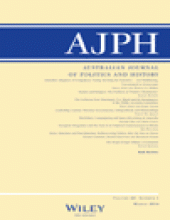Problems in Australian Foreign Policy: January - June 1991
Joseph A. Camilleri, 'Problems in Australian Foreign Policy: January - June 1991', Australian Journal of Politics and History, 37(3), December 1991, 375-395.

In Australia as in the rest of the world the Gulf crisis continued to occupy centre stage in
the early months of 1991. The intense drama of political and military confrontation,
graphically portrayed on the television screen, captured the public’s attention and
concentrated the, mind of the policy maker. For the Hawke Government the Gulf war
became a major focus of foreign and defence policy, not only by virtue of Australia’s
direct military involvement but because of its implications for relations with the United
States on the one hand and for regional security on the other. Yet for all its dramatic
quality and the rhetorical claims made for it as harbinger of a new world order, the Gulf
war was perhaps not the epoch-making event many imagined it to be. With the benefit of
hindsight, a number of other trends, though their impact was less visible at the time,
would in the long run exert greater influence on the shape of Australia’s external
environment. The political upheaval inside the Soviet Union coupled with a series of
strategic realignments and the gradual redistribution of economic power, in part reflected
in the Gulf war, could not but have a far-reaching influence for the Asia-Pacific region.
Though Australian diplomacy demonstrated a keen appreciation of the importance of
these developments, there was as yet little evidence of a coherent analysis and at best a
few tentative steps towards a redefinition of Australian objectives and priorities.
